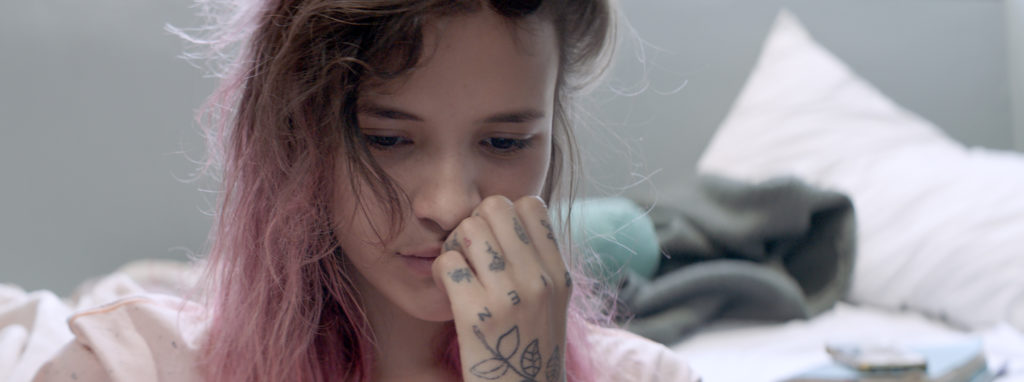Catalina Arroyave was born in Medellín, Colombia. In 2010 she co-funded Rara, an-art house producing company based in Medellín. She has worked as an assistant director and teacher for several years. “Days of the Whale” is her debut film.
“Days of the Whale” will premiere at the 2019 SXSW Film Festival on March 10.
W&H: Describe the film for us in your own words.
CA: “Days of the Whale” is my first feature film. It tells the story of Cristina and Simón, two young graffiti artists from Medellín, a city that deals with the consequences of a violent history. They defy their environment when they decide to paint a mural over a threat written on a wall.
W&H: What drew you to this story?
CA: I was born and raised in Medellín. My spirit confronted different rigid structures while I was becoming a woman in this context: my family, my private university, the mafia culture of the city. This film is the result of this permanent feeling of coming up against something, as well as the nostalgic feeling I had for the people that helped me to grow up.
“Days of the Whale”talks about those days of being lost but feeling powerful.
W&H: What do you want people to think about when they are leaving the theater?
CA: I would like the audience to have questions about my city and the different frontiers that are a part of our everyday lives. I would especially love for them to feel mirrored by the characters and remember their own stories of love and disobedience when they watch the film.
W&H: What was the biggest challenge in making the film?
CA: The process of making this film started 10 years ago when my best friends and I decided to build a platform to experiment and support each other in our desire of making films in a city where there were no film schools until last year. The biggest challenge throughout the whole process was having enough courage to keep going for a decade and not thinking that it wouldn’t be possible or good enough.
W&H: How did you get your film funded? Share some insights into how you got the film made.
CA: Colombia has one production fund that all filmmakers apply to, the Cinematic Development Fund. It is the only way most Colombian films have to get financial support in a country like ours, where filmmaking is still a rare activity and getting half a million dollars is a titanic task. We were very fortunate because we won against several hundred other projects, and with the fund, we were able to shoot. However, it wasn’t enough money, and we didn’t have a co-production with another country, so we united efforts with other local companies and were able to finish the postproduction with their support. Also, in every stage, we applied to contests and won the prizes of our local institutions.
W&H: What inspired you to become a filmmaker?
CA: I don’t have brothers or sisters, so most of the time in my childhood I was surrounded by grownups. Books became a great company for me when I was little, as well as television, films, and my grandmother’s stories. Soon, I started writing short stories and poems in notebooks with my imagination being triggered by what I heard in other people’s conversations. Afterward, I started singing at school, and this merged with my interest in stories. Filmmaking appeared like the place where everything that I loved could exist together, so I started trying to make films.
W&H: What’s the best and worst advice you’ve received?
CA: The best piece of advice is a quote from a Colombian writer, Fernando González, that a friend said to me once: “Know what you want. Want it like the one who drowns wants air. Be ready to pay the price.”
The worst advice I got was from a teacher at university: “Don’t you even try it.”
W&H: What advice do you have for other female directors?
CA: I think that years of male chauvinist culture have given women creators, especially young ones, the feeling that their stories are not interesting and that only other women can care about what they have to say. I’ve discovered this to be false. So I would encourage them to find what they deeply care about and talk about it in a way they feel comfortable with.
W&H: Name your favorite woman-directed film and why.
CA: The first one that pops into my head is “Fish Tank” by Andrea Arnold. I was very impressed by the powerful characters, the great acting, and the beautiful way of showing life through cinematic language. Also, “The Virgin Suicides” by Sofia Coppola. I always remember a conversation between the youngest sister and the doctor in the hospital where he says to her, “You’re not old enough to know how bad life can be,” and she answers, “Clearly doctor, you’ve never been a 13-year-old girl.”
W&H: It’s been a little over a year since the reckoning in Hollywood and the global film industry began. What differences have you noticed since the #MeToo and #TimesUp movements launched?
CA: Many. The strongest one is the feeling that we are actually paying attention to something that was ignored throughout thousands of years of Western civilization: violence against women. But I also consider it to be dangerous that in some cases the word “abuse” is being used in an irresponsible way, especially in social media, to intentionally damage professional careers and personal lives. I celebrate these movements that are emerging worldwide that allow women to speak up. We have a chance to be heard, which is a great opportunity but also a great responsibility.







